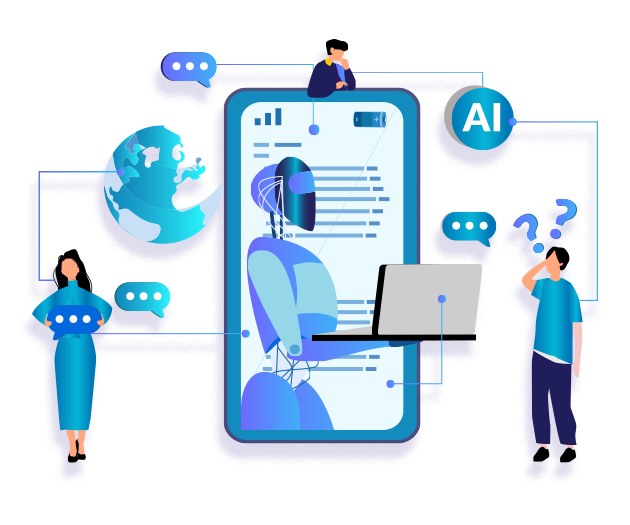Technology is developing at a rapid pace and so are the changes along with it. For instance, customer interaction with brands has been transformed to another level due to this technological evolution. Artificial intelligence is becoming a part of everyday activities and they are being utilized for streamlining the processes.
To facilitate the complexities of human speech, conversational AI and AI-powered voice-activated chatbots are being considered as alternate support systems in addition to chat.
Computing power and data storage are on the rise and as a result, AI (Artificial intelligence) methods allowing machines to learn with optimal human intervention have materialized.
Conversational AI (Artificial intelligence) is nothing but systems interacting with humans. Virtual assistants such as Alexa, Siri, and chatbots such as Tidio, and Kuki are examples of conversational AI.
Machine learning, Natural language processing (NLP), and automated answers are responsible for the working of Conversational AI tools. Chatbots are getting more advanced and automatic replies, and engaging in human-like communications with a consumer has emerged in recent times.
Many businesses such as banking, marketing, retail, etc. have executed such conversational AI systems.
Considerable research has been carried out on Artificial intelligence in the field of healthcare and pharmaceutical sectors and it has a great level of disruption potential. The worth of the digital healthcare market in India IN 2018 was INR 116.61 billion and is expected to attain INR 485.43 billion by 2024, growing at a compound annual growth rate (CAGR) of 27.41% from 2019 to 2024.
These figures may appear to be a little low because the COVID-19 pandemic has accelerated this transition. COVID-19 has fundamentally altered how people perceive healthcare and how institutions intend to provide it. The pandemic helped realize the gaps in healthcare and systems globally.
Conversational AI can play an important role in saving the physician’s time by handling their administrative tasks as research reveals that one-sixth of the average physicians’ working hours are spent on such tasks. When such tasks are delegated, physicians can dedicate their time and energy to other emergency duties. People will also be able to access the facilities as per their requirements.
Here are some examples of Conversational AI applications in the healthcare industry.
- Booking appointments
Chatbots or voice bots can help the patients in getting the required information and let them book an appointment with the doctor of their choice. There are facilities in certain hospitals that allows patients to block a time slot of their convenience and sync it to their calendar and also the doctors.
- Responding to queries
Having a chatbot respond to the pressing queries of the patients can be time-saving and also makes the process simpler. This is because the chatbots will swiftly examine the patient’s area of concern and offer them a response. Previously a tedious process was followed in the hospital where a page on their website was dedicated to such queries or FAQs were available. This was quite stressful during emergency times since finding the correct section was a daunting task.
- Data collection and tracking
Chatbots can be well utilized by healthcare professionals. All the patient information, their records, and lab results can be retrieved in seconds with chatbots. The physician has to just go through all these data and then consult the patients accordingly.
Chatbots are also helpful for tracking purposes. They can be used in the administration section for tracking the patients and assigning resources accordingly.
- Health status tracking
Patients feel secure when they are cared for even after their doctor visits. Having a tab on their health and staying in touch with them is quite important. This is where conversational AI comes into the picture. It can be utilized in keeping track of the patient’s health and raise the red flag in case of an emergency where a physician’s involvement is required. Their complete recovery journey can be tracked efficiently with chatbots.
Conclusion
Gone are the days when conversational AI was just robots. Now they developed fascinating personalities and sound more human-like. Though therapy bots are available to offer emotional care and empathy, these are still in their early stages suitable only for children, and cannot carry extended conversations. As AI systems improve their ability to automate repetitive tasks with greater precision, the next frontier will be the enhancement of these bots’ humanity.













